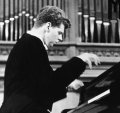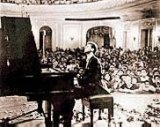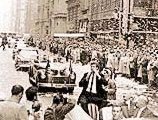
Van Cliburn
History, politics, dirty tricks and a dramatic finish: all this and more lies behind this week's recording, the most famous and best selling classical album of the 1960's. And what a story it is!
The Times
1957. The Cold War is icing up and freezing over. The Russians are the enemy, Communism is the greatest threat to the Free World. Krushchev famously announces to the West "We will bury you!" and emphasises the point by banging his shoe on the polished UN tabletop.
In October Russia launches Sputnik, and Americans haplessly watch the skies as the Totalitarian technology cruises over their heads. There is a real fear that this same technology could easily deliver a cargo of nuclear weapons. The comfortable world of the 1950's has suddenly become a small and frightening place.
The Competition
In March, 1958 the First Moscow Tchaikovsky Piano Competition is about to begin. The line-up is daunting. The General Chairman is Dmitri Shostakovich, and the jurors include such revered names as Sviatoslav Richter, Emil Gilels, Dmitri Kabalevsky and Sir Arthur Bliss. 50 contestants from around the world, each required to play concertos by the very Russian Tchaikovsky and Rachmaninov.

Piano Competition
Into this ferment steps a lanky (6'3") Texan with the unlikely name of Van Cliburn. The Hall is packed for the final round, the atmosphere electric. Most of the audience have never seen an American, their indoctrinated distrust overpowered by their curiosity and love of music.
Cliburn's choice is bold: the Tchaikovsky First Piano Concerto, and the Rachmaninov Third. Both well-known, well-loved and fiendishly difficult. This is not music to play wrong in front of the home crowd.
Cliburn plays his heart out. Technically perfect, full of insight and virtuosity, he breaths new vigour and personality into these concert-hall standards. The audience erupts into applause, applause that does not stop until Gilels leads Cliburn out onto the stage to finally acknowledge it.
Skullduggery
The jurors are faced with a dilemma. Although Cliburn is clearly the best, he has one great disadvantage in their eyes: he is American. Many of the jurors had already picked out a Russian, Lev Vlasenko as the winner, a decision they thought would meet with the approval of Krushchev and the audience.
And so they give Cliburn a very average score. Richter senses what is happening and to redress the imbalance awards Cliburn a perfect 25 out of 25, and many of the other pianists zero. When confronted about his unusual scoring system, Richter replies "People either make music or they don't."
Richter and Gilels decide to approach Krushchev directly. Krushchev asks who is the best. Krushchev and Gilels reply that it is Cliburn. "Well," says Krushchev, "in that case, give him the Prize!"
The Homecoming

Van Cliburn's Homecoming
Cliburn returns to the United States a hero, the “Texan who Conquered Russia”. He is given a ticker-tape parade welcome in New York City, and a string of concerts and recording contracts make him a household name.
His first recording on returning to the US is the same Tchaikovsky Piano Concerto no.1 with Kirill Kondrashin, the same conductor as for the competition. The record is an instant best-seller, the first classical record ever to sell over a million copies.
And that is the recording on this CD, coupled with the Rachmaninov Piano Concerto no.2 with Fritz Reiner and the Chicago Symphony. The unforgetable twelve chords that open the Rachmaninov welling up and melting into one of the most gorgeous melodies of the twntieth century. Richly inventive, these recordings signalled the return of the personality to the stage, not surprising as Cliburn's teachers have a legacy dating back to Franz Liszt.
Intermission
After a very successful and lauded career performing and recording, Van Cliburn gave it all up in 1978, initially aiming to rest for a year, but which stretched out to ten.
“I'd always known that someday I would take some time off just for myself. Even before Russia, I had said 'I know the first part of my life I would have to work very hard, and I would want an intermission because I know the last part of my life I would again have to work very hard'”
Only in 1987 did he return to the stage, at the invitation of the President Reagan. The occassion was a visit by Mikhail Gorbachev to celebrate the thaw in relations between the superpowers. Gorbachev invited Van Cliburn back to Russia for a series of concerts which were a huge success.
A full circle of art bridging enemy nations. And to think it all started with the Tchaikovsky Piano Concerto - this is a recording to treasure.
Please support Good-Music-Guide.com
by purchasing this CD using this link.

Track Listing
Van Cliburn
The Legendary 1958 Recording
Tchaikovsky Piano Concerto no.1
Kirill Kondrashin
RCA Symphony Orchestra
Rachmaninov Piano Concerto no.2
Fritx Reiner, Chicago Symphony Orchestra
Pyotr Il'yich Tchaikovsky,
Piano Concerto No. 1, in B flat minor, Op. 23
- I. Allegro Non Troppo E Molto Maestoso
- II. Andantino Simplice
- III. Allegro Con Fuoco
Sergey Rachmaninov,
Piano Concerto No. 2 in C minor, Op. 18
- I. Moderato; Allegro
- II. Adagio Sostenuto
- III. Allegro Scherzando